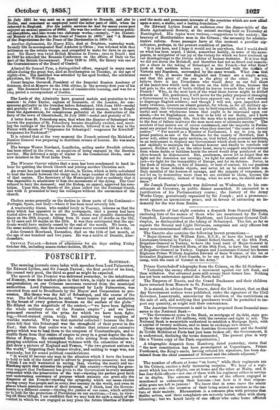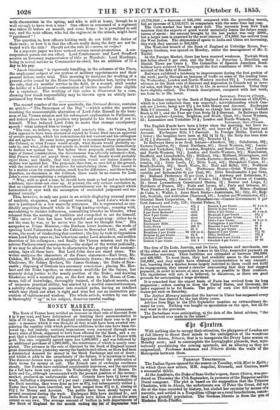The number of officers at home "on leave," while their
regiments are in the Crimea, excites a daily increasing surprise. We hear of a regi- ment which has two depfite, one at home and the other at Malta, and it has four field-officers—not one of them with his regiment either in service or in depOts. The extreme youth of some of the officers engaged is mentioned as enhancing their heroism—but how is it that respon- sible posts are left to juniors ? We know that in some cases the senier officers are sick—the occasion of their being seized as curious as the no- tore of their malady. Rheumatism is a common plea with privates that dislike action, and their complaints are severely tested, often with sharp blistering ; but we heard lately of one officer who came home afflicted with rheumatism in the spring, and who is still at home, though he is well enough to have won a race! One officer in command of a regiment was taken ill before an assault, and came home: he is permitted to sell out, and the next officer, who led the regiment in the attack, might have "purchased"! The question is, how officers holding rank do not fulfil the duties of their rank ; or how it is that the officers really doing the duty are not in- vested with the title ? Should not the rule be—serve, or resign?
In a separate paper we have noticed certain recent promotions. A cor- respondent points out one effect. Lord Combermere and Lord Strafford receive an honorary augmentation of title as Marshals : Lord Hardinge, being in actual service as Commander-in-chief, has an addition of 71. a day to his pay.
"Jacob Oranium " is vigorously handling, in the columns of the Times, the unpleasant subject of our system of military appointments and their present failure under trial. This morning he analyzes the working of a general order issued by the Horse Guards in September last, laying down the rule, that six months' service in the field, or a wound, shall render the holder of a Lieutenant's commission of twelve months' date eligible for a captaincy. The working of this order is illustrated by a case, showing how much responsibility may be thrown upon an utterly inex- perienced boy from school.



























 Previous page
Previous page